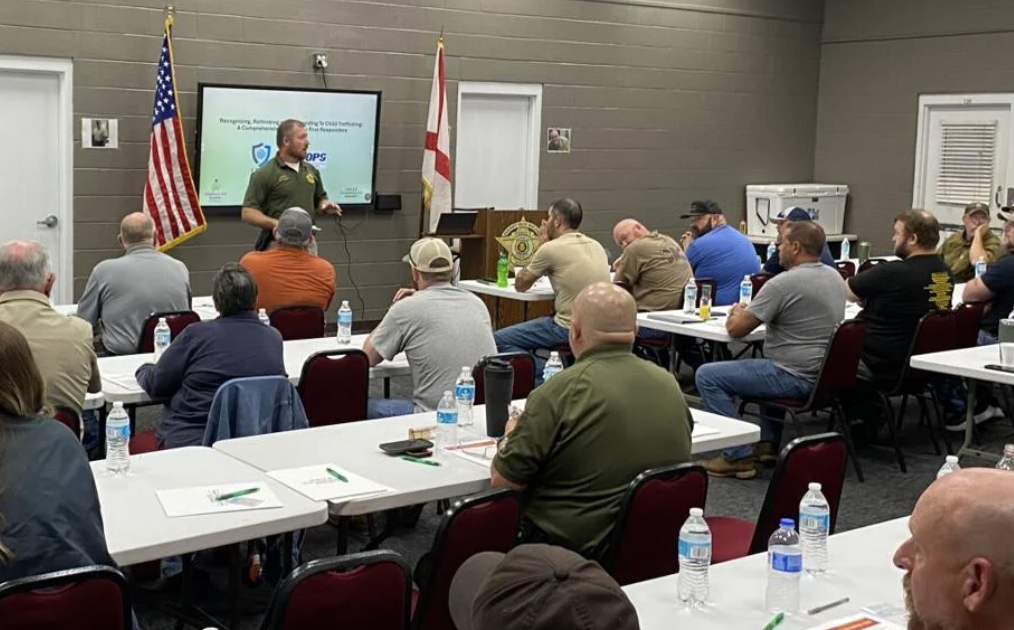Story by Donna Thornton donna@southerntorch.com
he DeKalb County Sheriff’s Office became the first Alabama law enforcement agency to host updated training about child trafficking for its officers and those from surrounding agencies, and social workers or others who may encounter trafficking in their duties.
Sheriff Nick Welden said the subject of the day-long training was important to him, because it involved children. If that does not hit people in the heart, he said, they should probably be working somewhere else.
The training – Recognizing, Rethinking, and Responding to Child Trafficking -- was presented by the Child Trafficking Solutions Project, a part of the Children’s Aid Society, with the aims to:
Reduce and prevent child trafficking, including on-line and labor;
Improve access to survivor care from street to stability;
Prosecute perpetrators.
While sex trafficking is the darkest part of any human trafficking, the training looked at child labor trafficking, too. Recent headlines about child labor trafficking include cases from the Decatur area, and from Montgomery, where Hyundai is being sued after an investigation into child labor at a supplier plant.
James Barrett of Child Trafficking Solutions Project said he’s a Collinsville native, and he appreciated the City of Fort Payne and the sheriff’s office for its behind the scenes work to bring the training to northeast Alabama.
“I’m here today to defend the pursuit of happiness,” Barrett said. “It’s a simple notion bestowed on us all by our Constitution. The right to pursue happiness for so many of these children is stripped away. It’s raped, it’s abused, it’s taken by force, bribes, or coercion, and it results in the momentary happiness of another.”
Jan Bell, who cofounded and directs CTSP, said one of the challenges to combatting child trafficking is the belief that “this is not really a problem” or “this doesn’t happen in our community.”
She noted cases in recent years that have occurred in Alabama: in Cullman, Dothan, and other locations, where predators contacted
children online and traveled to to meet them for sex. At a Decatur chicken plant, underage children were being employed – something discovered after a child kept falling asleep in class. She told another student she was working nights at a chicken plant, and it was reported to a teacher and investigated. The company was fined – “convicted” of the crime, Bell said.
But shortly after, the 14-year-old girl was reported missing.
“When you think about coercion, the message it sends to others working in that plant is strong,” Bell said, “And that fine is not. That’s maybe the cost of doing business.
“This is happening all over the state,” she said. “It’s a huge safety issue for these children.”
The issue of trafficking hinges on something of value being exchanged, for a child’s labor or for sexual exploitation.
That thing of value can be money, drugs, rent, etc.
She recounted a case where a grandmother “sold” her grandchild to a boyfriend. Perhaps the most troubling aspect of the case was a quote from the victim’s mother: “My mother did this to me. I don’t see what’s wrong.”
In case of familial child trafficking, it can be inter-generational, and those involved don’t know anything different.
Jesse Smith and Kinsleigh Bush, director and assistant director of the Northeast Alabama Human Trafficking Task Force, presented Human Trafficking 101.
Smith said people tend to think trafficking is like the movie “Taken,” but it rarely involves kidnapping as the movie depicts, or smuggling people across the border.
Instead, he said, trafficking is forcing or coercing involuntary labor or sex. “It’s highly profitable for traffickers. They can sell the same product – a human being – over and over,” he said.
Cartels are moving into trafficking, he said, because it is safer than drugs.
“Familial trafficking is the most common form of trafficking we have here in the State of Alabama,” Smith explained.
“What we’ll see is parents, grandparents, aunts, uncles, guardians, renting their children for either narcotics – its almost always narcotics – or rent.”
Labor trafficking is using children under the minimum age limits or in hazardous professions.
With child sex trafficking, law enforcement and prosecutors do not have to prove force, fraud or coercion. “For an adult we do,” Smith said. “When it comes to labor trafficking, we do have to prove those things.”
Signs of labor trafficking include people being forced to live with the person they work for, being under-paid, and having travel or identification documents kept by their employer, or giving their wages to someone else.
There are cases of debt-bondage, he said, where someone will pay a “coyote” to get into the country and them have to work to pay them – often with an increase in the fee.
“They will control that person’s life until the money is paid back,” Smith said.
Typically, people are told they will be brought here for one job, to be a nurse, for example, then find themselves thrown into janitorial work.
Forced labor is found at large sporting events, anywhere kids hang out, he said, and after natural disasters. After Hurricane Katrina, Smith said, people were brought in for forced labor.
Online “sextortion” has become a number one tool for predators. They form a relationship online and use it to get explicit photos, and use the threat of disseminating them to further exploit the victim.
“They have access to our kids, inside our home,” he said.
Smith said the task force tries to highlight for those in school systems “how dangerous being online is for our kiddos, how easy it is for them to get sexploited.”
Smith said the task force works with an Arizona-based agency that tracks human trafficking and has identified a corridor with the state as one of the most heavily traveled corridors for human trafficking, based on what people crossing the border tell them they are going .
“Last year, they told us, in Marshall County alone, there were more than 1,000 unaccompanied minors placed in our area, but only 6% of case studies were done with those minors. So we have a lot of kiddos come into our area.”
Human Trafficking 101 was a small part of the education and training provided for those at the sheriff’s office Monday.
Training was also provided in federal and state laws related to trafficking, by Leeann White of the U.S. Attorney Northern District, and Ninth Judicial Circuit District Attorney Summer Summerford, working with foreign-born nationals, and victim-centered, trauma-informed response.
Law enforcement officers from across DeKalb County and surrounding agencies also were given lists of resources to turn to when they deal with victims of human trafficking – places where victims can get counseling and support that they need to recover from being victims of this “modern day slavery.”





